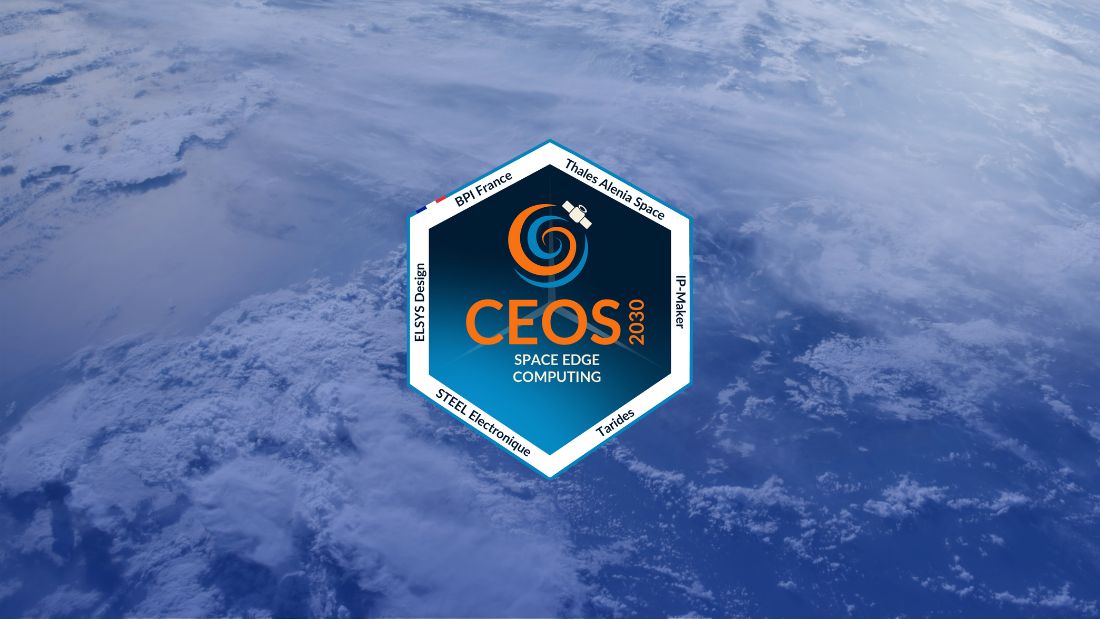
CEOS2030, Space Edge Computing Solution
A 100% French consortium led by STEEL Electronique (subsidiary of ACTIA Aerospace) and including ELSYS Design (subsidiary of ADVANS Group), IP-Maker, Tarides, and Thales Alenia Space, with the participation of IRT Saint Exupéry, announces the launch of the CEOS2030 project, an ambitious initiative to develop on-board artificial intelligence solutions for Earth observation satellites.
Certified by the Aerospace Valley competitiveness cluster, CEOS2030 is supported by the French government and BPI France as part of France 2030.
An innovative response to the challenges of Earth observation
July 3 2025 – Observation satellites play a central role in understanding and preserving our environment, from monitoring biodiversity and forests to managing water resources and detecting natural disasters such as forest fires and oil spills. However, their operation is currently constrained by a fixed architecture: the absence of high-performance on-board processing means that most of the time, all data must be repatriated to the ground before any analysis can be carried out.
The CEOS2030 project proposes a break with this model: by integrating on-board processing capabilities into satellites, it will enable data to be processed and valorized as close as possible to their source. The result is less useless data transfer, greater responsiveness to events, and optimization of space resources.
A modular, frugal and scalable solution
CEOS2030 is based on an open, scalable architecture that enables new applications to be deployed dynamically over the life of the satellite. Based on a combination of advanced technologies – NVMe protocols for storage, latest-generation FPGAs, frugal embedded AI, and unikernels – this solution will reduce the ecological footprint of space data processing, while improving mission operational performance.
A large-scale technology demonstration
The project includes a representative demonstration of operational scenarios. This includes an instrument simulator generating various image streams (visible, hyperspectral), several AI algorithms (cloud detection, identification, change detection) and compression mechanisms.
This demonstration, scheduled for the second half of 2027, will demonstrate CEOS2030’s ability to execute complex on-board processing in parallel, with a performance compatible with the requirements of in-flight operational scenarios by 2030.
Partners’ quotes
“CEOS2030 represents a major step forward for embedded intelligence in space. Thanks to our expertise in embedded electronics and AI, we’re helping to build a reliable, scalable and high-performance solution.”
Jean-François Béraud, Director of Innovation, ELSYS Design
“CEOS2030 enables IP-Maker to demonstrate the relevance of its NVMe storage technologies in a demanding space environment. Our objective: to guarantee fast, reliable and secure access to on-board data.” Jérôme Denis, CEO, IP-Maker
“Tarides’ technology, based on unikernels, offers a frugal and secure response to the needs of embedded space by combining application virtualization and performance. The CEOS2030 project gives us the opportunity to integrate it into a state-of-the-art system designed with the combined expertise of our partners, to guarantee the flexibility of the final solution without compromising on its security.” Thomas Gazagnaire, CEO, Tarides
“Complementing the ORCHIDE onboard orchestration solution currently under development, this project is in line with our vision of tomorrow’s space: modular, agile, and capable of adapting to users’ evolving needs. We are pleased and proud to be piloting the system architecture.” Hervé Didtsch, R&D Leader Observation and Science Systems, Thales Alenia Space
“CEOS2030’s ambition is based on mastering hardened space electronics while using the latest generation of commercial technologies. We are putting our expertise at the service of a sovereign and robust solution, designed to last.” Rémy Laffourcade, Sales Director, STEEL Electronique
About the CEOS2030 project
CEOS2030 (data Center and Edge cOmputing in Space) is a collaborative research and development project aimed at designing an onboard computing solution for observation satellites. Based on a modular architecture, the system combines cutting-edge technologies (embedded AI, NVMe storage, compression, unikernels) to process data as close as possible to the sensors. CEOS2030 is accredited by the Aerospace Valley competitiveness cluster, and is supported by the French government and BPI France as part of France 2030. The project is led by a French consortium headed by STEEL Electronique (a subsidiary of ACTIA Aerospace) and including ELSYS Design (a subsidiary of ADVANS Group), IP-Maker, Tarides and Thales Alenia Space, with support from IRT Saint Exupéry.